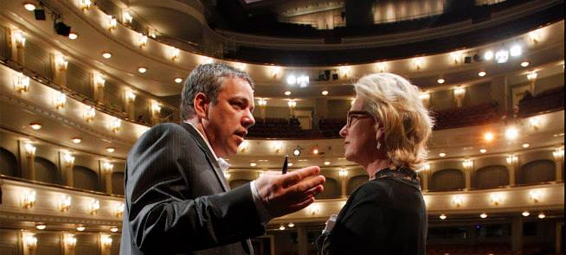My frequent visits to the first round of the quadrennial Cliburn International Piano Competition, currently in progress at Bass Performance Hall in Fort Worth, revealed an event that, for the most part, continues to flow with the admirable efficiency that has allowed that contest to bring musical geniuses ranging from Radu Lupu to Olga Kern into the international spotlight.
However, the current management of the Cliburn, still wet behind the ears after four years of tumultuous (and, in Fort Worth fashion, politely behind-the-scenes) maneuvering, has unnecessarily painted itself into a corner over the issue of jury impartiality.
Joheved Kaplinsky, the head of the piano department at Juilliard, has served on both the screening jury (which travels the world every four years to audition applicants for the preliminary round) and the main jury at the Cliburn since 2001. Her students have been a major presence in the competition now for four consecutive cycles of the competition, coinciding with her presence on those juries. This has led to increasing questioning of her role and and ever louder charges of undue influence, both in publication and in rumor in the classical music world. This time around, six of the thirty competitors in the preliminary round, selected by a screening jury of which she was a member, were her students. An additional three studied or are studying at Juilliard in the piano department she chairs.
The rules of the Cliburn clearly state that a member of the jury may not vote for his or her own student. I have personally known Kaplinsky for twelve years, and have watched and listened to her students throughout that time. Her credibility and integrity as a juror, as a teacher, as a musician and as a human being are, in my opinion, beyond questioning. As a member of the audience and as a professional critic, I am personally satisfied with her judgment and honesty.
Unfortunately, in an ill-advised maneuver obviously designed to deflect audience awareness that a large number of students of one jury member are participating in the competition, newly appointed Cliburn Foundation CEO and President Jacques Marquis chose to eliminate the listing of teachers in the biographies of competitors in the competition’s official program book. Naming teachers in the program book is a long tradition at the Cliburn and at all major competitions, and is both of immediate interest and usefulness and historical value.
This omission, which Marquis apparently hoped no one would notice, had the effect of pouring gasoline onto a fire. When Dallas Morning News classical music critic Scott Cantrell aptly pointed out that the absence of teachers’ names in the program book looked “fishy,” Marquis made matters still worse by obliquely insisting, in a public response, that listing the teachers—even though this has been done for decades at the Cliburn and other competitions—somehow takes the focus of the competition away from the competitors. If this is the case, one might well ask, why does the program book list the schools at which the competitors study or have studied? Has any teacher, student, critic, or audience member ever seriously objected to the listing of teachers in a competition program book?
Stonewalling this will not work. If Marquis is concerned about jury favoritism, as he appears to be through his action of deliberately omitting the names of teachers from the program book, he should come clean. It’s a little late to remedy the situation at the 2013 Cliburn, but the competition must, in the future, make sure that not only is the jury above partiality, but that no appearance of partiality is allowed to linger. Marquis and the Cliburn organization must either be ready to defend the presence of a juror whose students figure prominently in the competition or replace the juror. As Julius Caesar allegedly said, two thousand years ago, “Caesar’s wife must be above suspicion.” And even the appearance of jury partiality can not be permitted at the Cliburn if that event is to maintain its role as the leading piano competition in the world.
****
Wednesday night, I stretched out flat on my back on a floor mat at the Nasher Sculpture Center—along with about a third of the audience of thirty or so—for one of the most amazing musical experiences of my life.
The Soundings series at the Nasher has for three consecutive years consistently served as a cutting edge on the Dallas concert scene, presenting events of remarkable intellectual and artistic content under the leadership of pianist Seth Knopp at the arts district facility. This, the final event of the 2012-13 series, was made up entirely of a performance of Le noir de l’étoile (The Darkness of the Star), a remarkable work for percussion ensemble, tape, and live electronics composed in 1990 by the French composer Gérard Grisey. (Grisey died in Paris at the age of 52 in 1997.)
Inspired by the discovery in 1967 of quasars—regular rhythmic signals from collapsed stars—Le noir de l’étoile features six percussionists ranged around the audience as well as actual electronic transmission of quasars as part of the aural experience. The hour-long work ranks, like Beethoven’s Ninth Symphony, as one of those rare creations that not only attempts to meaningfully define our place in the universe, but which compels the listener surrender to a constant stream of percussion in which space and distance are an essential element. As is the case with other masterpieces of music—or visual art, or literature—real time becomes irrelevant, replaced by a transcendent reality that leaves the listener with a sense of heightened awareness.
The superb performance, presented twice on Wednesday by an awe-inspiring ensemble of internationally renowned percussionists including Eduardo Leandro, Doug Perkins, Ian Rosenbaum, Greg Beyer, Tim Feeney, and Ayano Kataoka, was prefaced by entertaining comments from Matthew Shetrone of the McDonald Observatory in Texas and Tom Geballe of the Gemini Observatory in Hawaii. The event will be repeated Saturday night in an open-air performance in Marfa, Texas.
Photo: Cliburn President Jacques Marquis (left) with Chairman Carla Kemp Thompson (Credit Ralph Lauer for The Cliburn, via)






